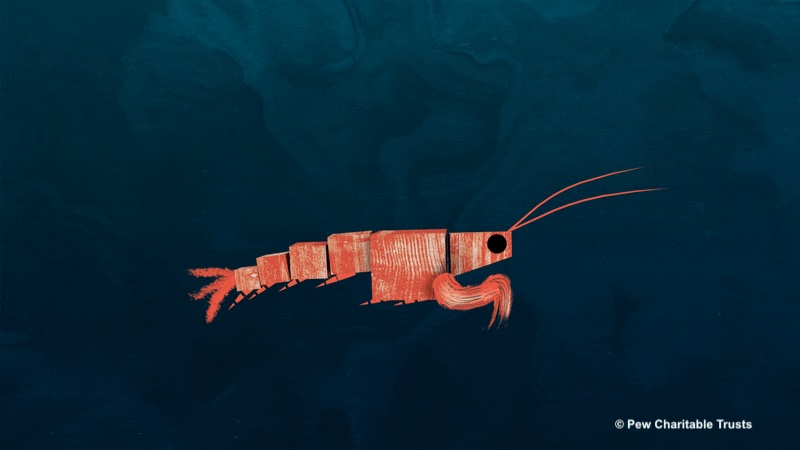Help us celebrate World Krill Day, August 11 every year!

Happy World Krill Day! On August 11th each year, we celebrate the amazing Antarctic krill (Euphausia superba). These tiny creatures, about 5-6 cm long, play a crucial role in the Antarctic ecosystem as the primary food source for many species. By consuming phytoplankton and algae, krill help capture carbon from the atmosphere, contributing to “blue carbon" storage in the ocean, making them vital for global carbon cycles and climate regulation.
Despite their huge importance, Antarctic krill don’t usually attract a lot of media attention. The aim of World Krill Day, first celebrated in 2022, is to raise awareness about krill worldwide through efforts by experts and NGOs.
Let’s celebrate the incredible Antarctic krill and their contribution to our planet on this third World Krill Day 2024!
Message from FoE Japan || Let’s create Marine Protected Areas to save Antarctic krill: Japan’s role in Antarctic Conservation
Though geographically distant, Japan and Antarctica share deep connections. Japan ceased direct krill fishing in Antarctica in 2012, selling its fleet to Korea. Since then, Japan has imported krill from countries like Korea, Norway, and China to produce krill oil (various uses) and meal (for livestock, aquaculture, pets, etc.).
The Commission for the Conservation of Antarctic Marine Living Resources (CCAMLR) is working to establish a network of marine protected areas (MPAs) to safeguard Antarctic ecosystems, but progress has been slow. Currently, there are active proposals to create three MPAs in key regions: the Antarctic Peninsula, Weddell Sea, and East Antarctica. For these MPAs to be established, unanimous agreement among CCAMLR’s 27 member countries is required, and currently, 21 nations support at least one proposal, with Japan (along with China, Namibia, Russia, and South Africa) yet to support even one of them.
Japan’s current fishing activities in the Southern Ocean are limited (only toothfish fishing), and it does not conduct krill fishing or whaling there, nor does it make territorial claims. The upcoming 43rd CCAMLR annual meeting in October 2024 presents Japan with a vital opportunity to advocate for peaceful use, climate protection, and marine conservation from a relatively neutral stance.
Internationally, Japan has made a variety of pledges to protect the oceans (including the Southern Ocean) through various forums such as the G7 and G20, UN-related agreements such as the BBNJ (High Seas Treaty), and initiatives under the Convention on Biological Diversity to protect 30% of the world’s oceans by 2030. And as Japan prepares to host the Antarctic Treaty Consultative Meeting (ATCM) in 2026, for the first time in 32 years, there is much anticipation to see more leadership, concrete and proactive policy efforts by Japan to protect the Southern Ocean.
FoE Japan, as a member of the Antarctic and Southern Ocean Coalition (ASOC), the only environmental NGO recognized for CCAMLR participation, has long supported the establishment of MPAs. We ask for your support to create MPAs in Antarctica and save the “little superheroes" of our planet, the Antarctic krill. Will you join us in advocating for Japan to support MPAs in the Southern Ocean?
The last ocean to be touched by humans and the first one we should protect
Antarctic Krill: The Unsung Heroes of Our Planet
How much do you know about krill? Antarctic krill are like a giant conveyor belt for carbon, consuming algae and dropping carbon-rich waste to the ocean floor. This process makes them crucial allies in the fight against climate change.
Currently, krill face threats from both climate change and intensive krill fishing around the Antarctic Peninsula. Protecting and preserving the krill and their environment is essential.
Just how much carbon do Antarctic krill transport to the seabed? An astounding amount equal to the emissions of 35 million cars every year. However, the climate crisis is causing unprecedented temperature rises in Antarctica and the Southern Ocean, endangering its rich ecosystems and wildlife. Nature knows no borders, so countries must collaborate to accelerate environmental protection in response to this climate emergency.
Antarctic krill are the main food source for many animals in the Southern Ocean, such as penguins, seals, and whales. In fact, 96% of the caloric intake for seabirds and mammals on the Antarctic Peninsula comes from krill. Even animals that don’t eat krill rely on those that do. Krill are thus indispensable to the Antarctic ecosystem. However, intensive krill fishing in Antarctica is further endangering species already at risk due to climate change.
Living creatures in Antarctica, including krill, are threatened by intensive fishing and climate change. Marine protected areas (MPAs) and well-designed fisheries management are needed to protect fish populations, habitats, and associated wildlife. Because the ocean knows no borders, connectivity between MPAs is crucial to enhancing their effectiveness. Thus, the Commission for the Conservation of Antarctic Marine Living Resources (CCAMLR) aimed to establish an MPA network in key areas by 2012, but only two MPAs have been established to date. CCAMLR must establish more MPAs to protect Antarctica’s precious wildlife and ecosystems. Time is running out.
Email Sign Up Form
We would love to be in touch with you! Please sign up to receive emails from us!
We will manage your personal information appropriately in accordance with the Personal Information Protection Rules.
SUPPORT US
Friends of the Earth Japan is carrying out its activities for protecting Antarctica with the support of you and the power of your voices. We hope that you will support our activities. Let’s raise our voices together to make change!